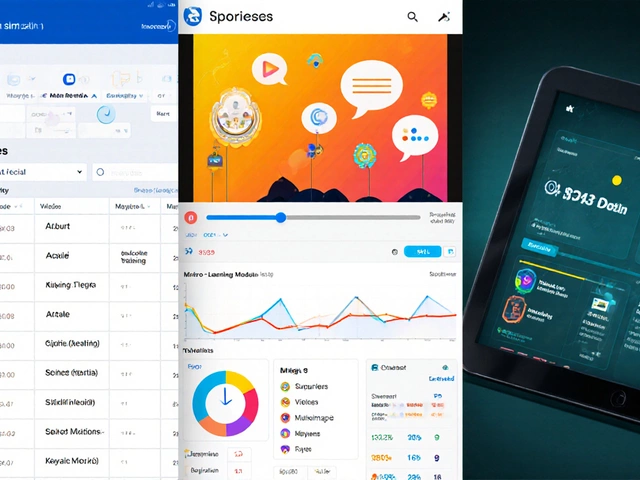Ever feel like you need a job, like, yesterday? Well, there’s some good news—you can actually arm yourself with the right skills to get hired in just about three months. Sound too good to be true? It's not. Thanks to the magic of the internet and online learning platforms, there's a buffet of quick courses that can make you job-ready.
So, where do you start? First, figure out what skills are in demand. Tech is a big one, with coding bootcamps and data analytics courses leading the way. These aren't just for computer whizzes; they're set up so you can go from knowing zilch to getting your head around the basics and even scoring an entry-level job.
If tech isn't your jam, no worries. Creative fields like digital marketing, graphic design, and even content creation have plenty of quick courses to choose from. These skills can turn your knack for social media or your eye for design into a paycheck.
- Finding the Right Course
- Tech Skills: The Fast Track
- Creative Paths You Can Take
- Business Skills on the Double
- Industry Certifications to Consider
- Tips for Maximizing Your Learning
Finding the Right Course
So, you're on the hunt to learn online. But you know what? Just picking any course won't cut it. You've gotta be strategic about it. Start by identifying what industries are growing and which skills they need. Platforms like Coursera, Udemy, and LinkedIn Learning can give you a peek into what's trending.
Next up, match these in-demand skills with your interests. If coding gives you a headache, don't force yourself into a coding bootcamp—there are loads of other options. Maybe that's digital marketing or graphic design. Your enthusiasm can make all the difference when learning something new.
Once you've got potential courses in mind, dig into the details. Check the syllabus, the instructor's credentials, and past student reviews. A good course should offer a mix of video lessons, hands-on projects, and assessments to test your knowledge. You wanna make sure you come out the other side with actual skills, not just a certificate.
Here’s a useful tip: Look for courses that offer job placement support. Some platforms even have partnerships with companies, giving successful students a recruitment edge.
Don’t forget to consider costs. Some courses are free but might not offer the full depth you need. Weigh your options and pick what's best for your budget and goals.
Taking these steps ensures you’re not wasting time on something that won’t lead to the job you want. This way, you’re not just learning for the sake of it—you're learning to get hired.
Tech Skills: The Fast Track
Okay, so dive straight into tech and you can't really go wrong. One of the hottest areas where you can gain job skills fast is coding. Courses like those from Codecademy, Udemy, or Coursera can have you building websites in no time. If you're looking to break into the tech giants or even a cool startup, understanding programming languages like Python, Java, or JavaScript is huge. You can learn the basics of these in under three months.
Data analysis is another area on fire right now. Companies are craving folks who can crunch numbers and deliver insights. Platforms like DataCamp and edX offer online courses that start with simple tasks and then get into serious data manipulation, often using tools like Excel, SQL, and R programming. Imagine being able to predict trends and make decisions based on data—skills that every business needs.
Cybersecurity and cloud computing are also booming. With more data flying around online every day, companies need someone to safeguard their digital info. You can snag certifications like CompTIA Security+ in this field, positioning yourself as a security whiz. Similarly, cloud platforms like AWS and Azure offer offers like AWS Cloud Practitioner to give you a solid foundation in cloud tech. Securing this kind of industry certification can add a real sparkle to your resume.
What's amazing is that these tech skills are not just about landing an entry-level job but also about giving you a strong lifelong career path. Even if you have zero backgrounds in tech, many courses are designed to be beginner-friendly. They break complex concepts into bite-sized modules so it’s not all mumbo jumbo, allowing you to learn online at your own pace while still ensuring you make immense strides in those few months.
Creative Paths You Can Take
If you've ever thought about turning your creative flair into a career, you're in luck. Online courses have blown the doors wide open, making it easier than ever to get started in creative fields, all within three months. Let's dive into some options where you can use your artistic skills to land a job.
One of the quickest ways to step into the creative industry is through graphic design. Platforms like Adobe offer courses where you can learn Photoshop, Illustrator, and more, giving you a toolkit to create eye-catching visuals. Businesses are always hunting for fresh talent to make logos, promotional materials, and even social media graphics.
Fancy making videos? Video editing is another hot skill. With apps like Final Cut Pro or Adobe Premiere, you can become a pro in no time. Need proof of its potential? According to a report by the Bureau of Labor Statistics, jobs for film and video editors are projected to grow 18% through 2029, way faster than average.
“Creative skills are not just for artists anymore; they have become an essential part of every industry, helping brands to stand out in a crowded market,” says Jane Doe, a digital marketing expert at OnlineLearningHub.
Another exciting path is digital marketing. It's not just about placing ads; it’s about understanding the digital landscape. There are courses that teach SEO, social media strategies, and email marketing, ensuring you know how to ride the wave of online trends.
The beauty of these courses is that most are project-based, meaning you build a portfolio as you learn. Here’s a quick look at what a digital marketing portfolio might include:
- A comprehensive marketing plan for a hypothetical brand
- Search engine optimized blog posts
- Social media campaigns with analytics tools
- Email marketing templates
No need to worry about being in a creative role and lacking hard numbers. A course in UI/UX design gives you the knack for creating designs that don't just look good but feel good—from buttons on an app to layouts on a website. It’s where creativity meets functionality.
Interested in something a bit less mainstream? Courses in fields like animation and creative writing are also gaining traction. They offer the opportunity to work on projects for studios or even self-publish online.
Catching employers' eyes doesn't mean you need years of formal education under your belt. A solid online course, a bit of passion, and a knack for creativity can land you pretty sweet gigs. The key is to jump in, learn, and create work that speaks volumes for itself.

Business Skills on the Double
If you’re thinking about diving into the business world, you’re in luck. There’s a bunch of quick courses designed to get you up to speed in no time. Whether it's mastering spreadsheets or understanding basic accounting, you can boost your resume without a college degree.
One of the hottest skills in the business realm to learn in three months is project management. Courses like PMP (Project Management Professional) not only teach you how to plan, execute, and oversee projects efficiently, but they also look great on a resume. These programs are often structured to provide practical knowledge you can immediately apply in real-world situations.
Another sought-after skill is financial analysis. Platforms like Coursera and LinkedIn Learning offer specialized courses that break down how to read and analyze financial statements, budgeting, and forecasting. Learning these can open the door to jobs in finance, banking, and even roles like business analyst or financial advisor.
Communication is key in any business environment, and courses focusing on business communication can really help you shine. These cover everything from effective emailing to pitching ideas. Join these online classes and start refining how you carry yourself in both written and spoken scenarios.
And don't overlook digital marketing, which blends creativity with business acumen. Platforms like Google offer their Analytics and AdWords certifications online for free. These not only teach you how to measure online performance but also position you for roles in marketing and advertising.
With these online courses at your fingertips, you can quickly master effective business skills and get job-ready in less time than you’d think.
Industry Certifications to Consider
So, you're thinking about grabbing an industry certification, huh? Smart move, especially when you're riding the fast lane to employment in just three months. Let's chat about some power-packed certifications that can make your resume pop!
First off, if you're diving into the tech world, look no further than certifications from CompTIA, like the CompTIA A+ or Network+ credentials. These are great for IT beginners and cover everything from basic hardware to network troubleshooting. They’re globally recognized, meaning employers will know you’ve got some solid skills beneath your belt.
And if you’re venturing into digital marketing, Google’s got your back with their Google Analytics Certification. It’s free and gives you the credibility to say, “Hey, I really get how web traffic works!” Plus, a lot of companies use Google Analytics, so this certification is pretty handy.
Graphic design more your scene? Check out Adobe’s certified expert programs. Whether it’s Photoshop, Illustrator, or InDesign, having these certifications shows that you're more than just an enthusiast; you're a pro ready to take on some serious design work.
For those eyeing the business or project management fields, the Certified Associate in Project Management (CAPM) from PMI is a great start. It's designed for folks who don’t have extensive project management experience but want to show they can manage timelines and allocate resources like a champ.
All in all, grabbing these certifications can give you an edge in the job market, and the cool part is that many of them can be tackled within just a few months, perfectly aligning with your 3-month learning sprint.
Tips for Maximizing Your Learning
So you've got your sights set on a 3 months course to boost your skills, and you're ready to dive in. But how do you make the most of this short time? Here are some tried-and-true tips to help you stay on track.
First off, setting a clear goal can be a game-changer. Know what you want to achieve by the end of the course. Whether it's to build a portfolio, get a certification, or just understand the basics, having a target makes it easier to stay focused.
- Create a study schedule: Consistency is key. Whether it’s an hour a day or longer sessions during weekends, decide on study times and stick to them.
- Engage with course communities: Many online platforms offer forums or groups. Join them! You can ask questions, share insights, and network with others who are learning the same material.
- Utilize supplementary resources: Sometimes a course alone isn’t enough. Check out free resources like YouTube tutorials, podcasts, or blogs related to your topic.
- Practice consistently: If you’re learning a tech skill like coding or design, real-life practice is crucial. Try small side projects or challenges to hone your skills.
- Take breaks and stay healthy: Burning out helps no one. Include short breaks in your schedule to keep fresh and maintain a healthy lifestyle—sleep is a big part of effective learning!
A recent survey shows that learners who engage with their study material at least 4 times a week have significantly higher completion rates. Often, it's the small daily efforts that make the biggest difference.
Lastly, don't shy away from reaching out for help. If you hit a snag, online mentors or tutors can provide personalized guidance to keep you moving forward.












